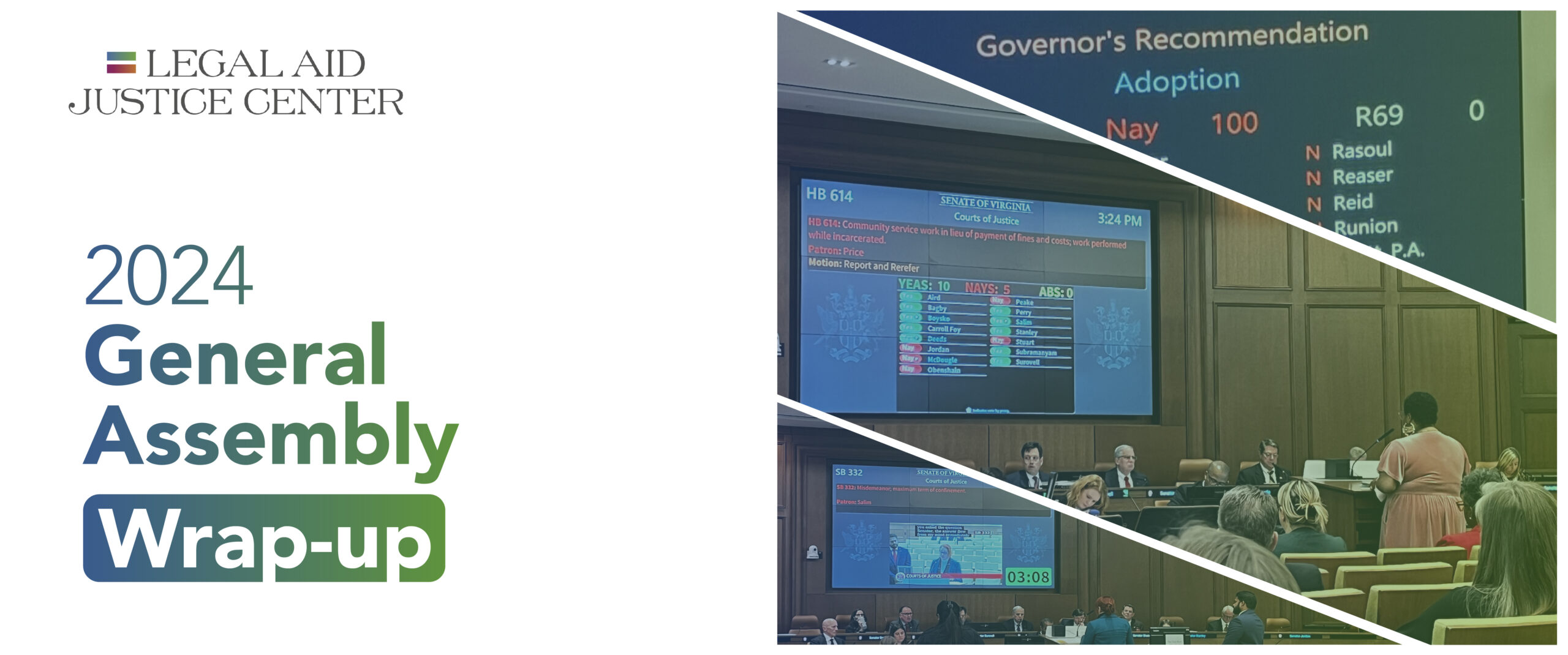
The General Assembly completed its reconvened (“veto”) session last month, and we wanted to provide a more complete rundown of outcomes for our legislative priorities.
What passed:
Three of LAJC’s priority bills will be going into law:
- HB 1114, Simonincreases court appearance fairness. This legislation, originally intended to end the criminalization of failure to appear in court, was amended to eliminate separate failure-to-appear criminal offenses for those who are currently incarcerated. It is part of an effort of the Virginia Pre-trial Justice Coalition.
- SB 625, Bagby / HB 896, Hernandezprevents courts from collecting a person’s social security benefits to pay court debt if that is their sole source of income. Currently, the Federal Code states that courts are unable to collect court costs from individuals whose sole income is Social Security. However, this does not always occur in Virginia, and this legislation ensures consistent standards of this practice.
- HB 1496, Rasoulcreates a registry for surveillance technology. This bill requires law enforcement to annually send a list of all surveillance technology deployed in their jurisdictions and requires that list of technology be shared with the Joint Commission on Technology and Science and the Crime Commission.
What didn’t pass:
Unfortunately, the following bills were vetoed by the Governor, but LAJC is committed to continuing to fight with our partners and impacted communities to address these important issues:
- HB 614, Pricewould have allowed work while incarcerated to offset court debt. Unclear parameters in the law and varied local practices have been leading to the denial of eligible requests to use work while incarcerated to offset court debt, increasing the already overwhelming amounts of debt assumed when an individual leaves a carceral setting. This legislation would have required courts to accept these requests if the requestor meets the requirements of the law.
- HB 612, Pricewould have delayed when court debt can be sent to collections. The current Virginia Code allows for an individual’s court debt to be sent to collections 90 days after a judgment is issued if they have not set up a payment plan or paid their bill in full. The legislation would have increased this to 180 days, giving some much needed space for people to handle the burden of court debt while also reducing debt collection fees for Virginia.
- HB157, McClurewould have eliminated the farmworker exemption to minimum wage raises. A vestige of Jim Crow-era state laws, Virginia continues to exempt farmworkers and workers on H-2 migrant worker visas from the protections of the Virginia Minimum Wage Act (VMWA). This bill would have removed these exemptions from the VMWA.
- SB 246 McPike / HB 1454, Lopezwould have extended the validity of the driver privilege cards and time-limited duration licenses to match a driver’s license. This would have reduced barriers to reliable transportation for immigrant Virginia residents.
The wait and see:
The Governor vetoed 153 bills and amended 116, which were sent back to the General Assembly for its reconsideration. Among the bills amended, were two LAJC priority bills addressing court fines and fees:
- HB 246, Jonescreates greater transparency for court fines with itemized court debt receipts. This legislation requires clerks to issue an itemized list of charges for court debt and is a way to increase transparency of fines, fees, and interest accrual.
- HB 824, Cousinscaps court appointed attorney debt in Virginia. This bill passed in the House and Senate in a narrower version than originally hoped for, but it would still mean any increase to compensation for court appointed attorneys does not get added to the fees charged to indigent defendants.
The Governor’s amendments weakened and undermined the intent of both bills, but thankfully the House of Delegates unanimously rejected those amendments. The Governor could still take final action and veto them but has another month to make that decision. LAJC will be monitoring these bills closely and awaiting their outcome. If they are not vetoed, they will go into law between July 1, 2024 and January 1, 2025.
The budget:
The Governor made 233 amendments to the budget, and those amendments were rejected by the House, which then adjourned without a final budget. This means the General Assembly will come back to Richmond for a special session on May 13th likely through May 15th to work on, and hopefully vote on, a final budget. The Fund Our Schools Coalition, of which LAJC is a steering committee member, is continuing to advocate for legislators and the Governor to fully fund our public schools and will be monitoring the newly presented budget closely.
What’s next:
It’s hard to believe, but we are already starting to gather with community members and partners to begin discussing, researching, and identifying the needs and priorities we will advocate for in the 2025 Session.
As we wrap up this session and begin to plan the next, we are holding tight to victories, lessons learned, the amazing work invested, and the power and strength of the beautiful people who stood up, raised their voices and who often come back year after year to keep on fighting for justice.
